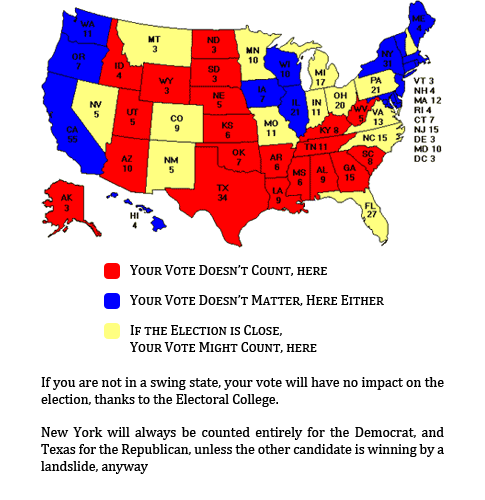| As I write this, it looks as if it has happened again. For the fifth time in U.S. history, and the second time in 16 years, someone has been elected to the White House despite losing the popular vote. Deadlines force me to write this on Wednesday, when the latest results show Hillary Clinton with about 200,000 more votes than Donald Trump nationwide — an amazingly thin margin considering about 120 million ballots have been counted. He, however, has a clear and convincing margin in the Electoral College, and that’s all that matters. You can outhit the other team or commit fewer errors, but only runs really count in baseball, and only electoral votes really count in the race for president. Crazy? Actually, it’s genius. |
| | The speed with which Clinton conceded late Tuesday may take some of the steam out of efforts to abolish the Electoral College this time. And, because Republicans are the beneficiaries of this constitutional wrinkle (as they were in 2000) and they control both houses of Congress, reform efforts wouldn’t likely get far. But whether or not Trump eventually makes up the difference in votes, the Electoral College is a good thing, and it must remain in place. If you need proof, just think back to what you watched Tuesday night as returns came in. You saw commentators time and again drawing contrasts between rural and urban areas. In Florida, Michigan and Wisconsin, they delivered powerful lessons about how differently people in big cities view the world than those who live in the country. Strategists were speculating as to whether Trump could amass enough collective country votes in Florida, for instance, to overcome large Democratic majorities in the Miami area. Discussions about Michigan centered on Detroit vs. the rest of the state, and so on. This election exposed a huge urban-rural divide, and that would have been completely lost in a system that relied only on the popular vote. As scholar and author Gary Gregg noted four years ago on politico.com, Barack Obama beat Mitt Romney in 2012 by a popular-vote margin of 3.3 million. But if you break that down, he collected 3.6 million more votes than Romney in Chicago, Philadelphia, New York and Los Angeles combined, and he did so without a lot of effort. The Electoral College turns the election into 50 separate state races for president. It forces candidates to appeal to those states in their entirety, along with the unique concerns of their residents. “Now, imagine an Obama candidacy free of the need to appeal to Ohio factory workers, Colorado cattlemen, Iowa hog farmers and Virginia police officers, and you start to get the picture,” Gregg wrote. “If the United States does away with the Electoral College, future presidential elections will go to candidates and parties willing to cater to urban voters and skew the nation’s policies toward big-city interests. Small-town issues and rural values will no longer be their concern.” That’s not to say it is a perfect system. Despite being marginally in play this time, Utah did not receive a single visit from either major candidate after the political conventions. Florida, Ohio and Pennsylvania — contested states with a lot of electoral votes — seemed to get visited every other day. But so did New Hampshire, with its four pitiful votes. That wouldn’t have happened in a nationwide popularity contest. It’s safe to say rural and urban areas nationwide share many defining characteristics, and the candidates were forced to address those. Can the system seem unfair? Of course. NPR did a calculation and found it would be possible to win with only 23 percent of the vote if you captured each of the 40 least populated states by just one vote. But that scenario is, of course, absurd. When Democrat Samuel Tilden lost despite winning the popular vote in 1876, he said, "I can retire to private life with the consciousness that I shall receive from posterity the credit of having been elected to the highest position in the gift of the people, without any of the cares and responsibilities of the office." That may be bitter consolation for Clinton, but it doesn’t change how well the Electoral College has served Americans. |


 RSS Feed
RSS Feed

